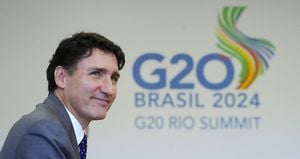China’s enormous auto manufacturing sector has reached new heights, with companies like BYD setting remarkable benchmarks. Recently, BYD celebrated producing its 10 millionth new energy vehicle (NEV), marking this achievement as a significant milestone for the company established back in 1995. With over 900,000 employees now, BYD has evolved from its humble beginnings as a battery maker to one of the giants of the automotive industry.
BYD's milestone vehicle, the Denza Z9, was unveiled amid great fanfare on November 15 during the 2024 Guangzhou Auto Show. This sedan embodies the company's commitment not only to electric mobility but also to innovation, as it offers both plug-in hybrid and purely electric versions, starting at approximately RMB 334,800 ($46,270). Celebrated by Feng Ji, CEO of Game Science—famous for the video game Black Myth: Wukong—the event symbolized the merging of technology and culture, referring to BYD's recent partnership with the video game company to digitize Chinese cultural heritage.
For BYD, this milestone is also reflective of the broader trends within China's ambitious EV sector, which has seen exponential growth. Four years ago, the company was selling fewer than 30,000 vehicles per month; today, it's selling more than 500,000—a staunch indicator of China’s surging electric vehicle (EV) market. The transition solidified when BYD ceased sales of internal combustion engine vehicles altogether back in March 2022.
BYD’s evolution resonates on the global stage where, as analysts project, the company aims to reach up to 6 million deliveries by 2026, with 1.5 million of those being exports. This ambitious growth aligns with their sales figures which hit 3.25 million NEVs from January to October this year, reflecting approximately 36.49% growth over the previous year.
But it’s not just BYD making waves; Chinese rivals are stepping up their game. Leapmotor, now part of Stellantis, looks to carve its niche within Europe, which has proven to be quite the challenge amid trade tensions and rising tariffs imposed by the EU on Chinese electric cars. Founder Zhu Jiangming confirmed collaboration with Maserati, utilizing shared expertise to refine new models, hinting at Leapmotor’s plans to break through the competitive European market by launching more affordable options.
Given the complex web of interactions tied to Chinese automotive exports, Leapmotor is feeling the pinch from the EU’s trade tariffs enacted earlier this year. These tariffs target Chinese electric vehicles and have prompted the company to momentarily stall its ambitions to expand manufacturing facilities outside of China, particularly its base established at Stellantis' plant in Poland. With about 200 dealerships across Europe, Leapmotor's goal was ambitious: to triple this number by the end of 2025. Yet, economic and political tensions threaten to alter or even halt progress.
Meanwhile, Valeo's CEO, Christophe Perillat, recently voiced concerns over the competitive edge of European car manufacturers, advocating for the implementation of U.S.-style measures to level the playing field against rapidly advancing Chinese automakers. Perillat's comments underscored the perception within Europe of mounting pressure from the well-established Chinese automotive segment, which threatens to dominate the global market.
With tariffs creating more barriers, the road forward seems filled with challenges. Leapmotor cadenced its strategy by emphasizing cost efficiency—claiming its manufacturing and research development all occur internally, which helps them keep prices low. This allows Leapmotor to craft vehicles for both budget-conscious consumers and those seeking high-quality, well-equipped models.
Leapmotor’s recent entries include models like the C10 SUV and T03 commuter, now available across 13 countries, including major markets like Germany and France. Yet, with the geopolitical climate shifting, the brand finds itself needing to navigate through choppy waters until EU-China negotiations reach some resolution.
This dynamic ecosystem showcases the fast-paced evolution of the global auto industry fueled by competition from China. The road to auto innovation is clear as companies, both established and newcomers, strive to adapt and thrive against the backdrop of shifting trade policies and consumer preferences.
So, where does the future lie for these automotive giants? While BYD showcases growth through innovation, competitors like Leapmotor face hurdles posed by trade policies. Amidst this balancing act, it’s clear China’s impact on global auto manufacturing is only just beginning, and how both the Chinese companies and their international counterparts respond will shape the future of the industry.



